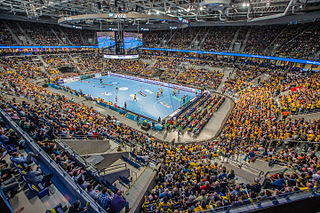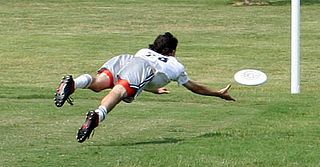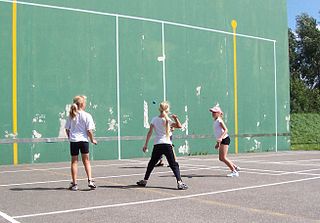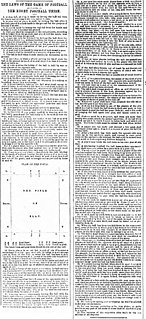

Ritinis (also ritinys, rypka, rifle, katilka) is a team sport originating in Lithuania. It is included in the World Lithuanian Games. [1] Ritinis was also represented in the TAFISA World Games. [2]


Ritinis (also ritinys, rypka, rifle, katilka) is a team sport originating in Lithuania. It is included in the World Lithuanian Games. [1] Ritinis was also represented in the TAFISA World Games. [2]
Ritinis is often played on a football field. Games last 40 minutes with a half-time interval after 20 minutes.
Two teams of seven players each (six strikers and one goal keeper) compete to throw the Rypka, a hard rubber discus, either behind their opponents' back line for 1 point, or in their opponents' goal for 3 points. Players can only throw the discus with their hands, while they can only block the discus with their bats, which are curved and are called Ritmuša.
It is common for teams to have five reserve players on hand.
Ritinis originated from the Lithuanian ethnic game that was played on an open field. It was known since at least the 17th century. [3] The first rule book of stadium ritinis game was written by Karolis Dineika in Vilniaus rypka (the rypka of Vilnius) in 1923. [4] [3]
In 1958 the Lithuanian Ethnic Games Federation was created and included ritinis. In 1973 a separate Lithuanian Ritinis Federation was established. The first Lithuanian National Championships were held in 1961. [3]

Canadian football is a sport played in Canada in which two teams of 12 players each compete for territorial control of a field of play 110 yards (101 m) long and 65 yards (59 m) wide attempting to advance a pointed oval-shaped ball into the opposing team's scoring area.

Field hockey is a team sport structured in standard hockey format, in which each team plays with ten outfield players and a goalkeeper. Matches are played on grass, watered turf, artificial turf, synthetic field, or indoor boarded surface. Players wear a standard kit consisting of jersey, shorts or skirt, shoes and, for safety, shin guards and a mouthguard. Each player carries a hockey stick which is made of wood, carbon fibre, fibreglass, or a combination of carbon fibre and fibreglass in different quantities. Using their sticks, the team endeavours to drive the round hockey ball, made of hard plastic, towards the rival team's goal. The stick has two sides; one rounded and one flat. Only the flat face of the stick is allowed to progress the ball. During play, goalkeepers are the only players allowed to touch the ball with any part of their body. A player's hand is considered part of the stick if holding the stick. If the ball is "played" with the rounded part of the stick, it will result in a penalty. Goalkeepers often have a different design of stick; they also cannot play the ball with the round side of their stick. The match is won by the team that scores the most goals.

Handball is a team sport in which two teams of seven players each pass a ball using their hands with the aim of throwing it into the goal of the other team. A standard match consists of two periods of 30 minutes, and the team that scores more goals wins.

Ultimate, originally known as ultimate Frisbee, is a non-contact team activity played by players with a frisbee, flung by hand. Ultimate was developed in 1968 by a group of students at Columbia High School in Maplewood, New Jersey. Although ultimate resembles many traditional sports in its athletic requirements, it is unlike most sports due to its focus on self-officiating, even at the highest levels of competition. The term Frisbee, often used to generically describe all flying discs, is a registered trademark of the Wham-O toy company, and thus the sport is not formally called "ultimate Frisbee", though this name is still in common casual use. Points are scored by passing the disc to a teammate in the opposing end zone. Other basic rules are that players must not take steps while holding the disc, and interceptions, incomplete passes, and passes out of bounds are turnovers. Rain, wind, or occasionally other adversities can make for a testing match with rapid turnovers, heightening the pressure of play.

Volleyball is a team sport in which two teams of six players are separated by a net. Each team tries to score points by grounding a ball on the other team's court under organized rules. It has been a part of the official program of the Summer Olympic Games since Tokyo 1964. Beach volleyball was introduced to the programme at the Atlanta 1996. The adapted version of volleyball at the Summer Paralympic Games is sitting volleyball.

Gaelic football, commonly known as simply Gaelic, GAA or football is an Irish team sport. It is played between two teams of 15 players on a rectangular grass pitch. The objective of the sport is to score by kicking or punching the ball into the other team's goals or between two upright posts above the goals and over a crossbar 2.5 metres above the ground.

Futsal is an association football-based game played on a hard court smaller than a football pitch, and mainly indoors. It has similarities to five-a-side football and indoor soccer.

Dodgeball is a team sport in which players on two teams try to throw balls and hit opponents, while avoiding being hit themselves. The objective of each team is to eliminate all members of the opposing team by hitting them with thrown balls, catching a ball thrown by an opponent, or inducing an opponent to commit a violation, such as stepping outside the court.

Gridiron football, also known as North American football or, in North America, simply football, is a family of football team sports primarily played in the United States and Canada. American football, which uses 11-player teams, is the form played in the United States and the best known form of gridiron football worldwide, while Canadian football, featuring 12-player teams, predominates in Canada. Other derivative varieties include arena football, football for smaller teams, flag football and amateur games such as touch and street football. Football is played at professional, collegiate, high school, semi-professional, and amateur levels.

The laws of Australian rules football were first created by the Melbourne Football Club in 1859 and have been refined over the years as the sport evolved into its modern form. The laws significantly predate the advent of a governing body for the sport. The first national and international body, the Australasian Football Council (AFC), was formed in 1905 and became responsible for the laws, although individual leagues retained a wide discretion to vary them. Since 1994, after the establishment of a nation-wide Australian Football League (AFL), the rules for the game have been maintained by the AFL Commission through its AFL Competition Committee.

This glossary of basketball terms is a list of definitions of terms used in the game of basketball. Like any other major sport, basketball features its own extensive vocabulary of unique words and phrases used by players, coaches, sports journalists, commentators, and fans.
The following terms are used in water polo. Rules below reflect the latest FINA Water Polo Rules.

A comparison of American football and rugby union is possible because of the games' shared origins, despite their dissimilarities.

One-wall handball, also known as 1-wall, wallball or international fronton is an indirect style of a ball game where the player hits a small rubber ball with their hand against a wall. The goal of the game is to score more points than the opponent. The player then hits the ball, and the ball bounces off the wall and the floor within court lines, if the opponent fails to return the ball, the player scores a point. The sport was created to bring varieties, such as American handball, Basque pelota, Patball, Gaelic handball, Pêl-Law and Valencian frontó.

This list is an alphabetical glossary of Australian rules football terms, jargon and slang. While some of these entries are shared with other sports, Australian rules football has developed a unique and rich terminology.
The following terms are used in American football, both conventional and indoor. Some of these terms are also in use in Canadian football; for a list of terms unique to that code, see Glossary of Canadian football.
A comparison of Canadian football and rugby union is possible because of the games' shared origins, despite their dissimilarities.

The laws of Rugby Union are defined by World Rugby and dictate how the game should be played. They are enforced by a referee, generally with the help of two assistant referees.

A free kick is a method of restarting play in association football. It is awarded after an infringement of the laws by the opposing team.